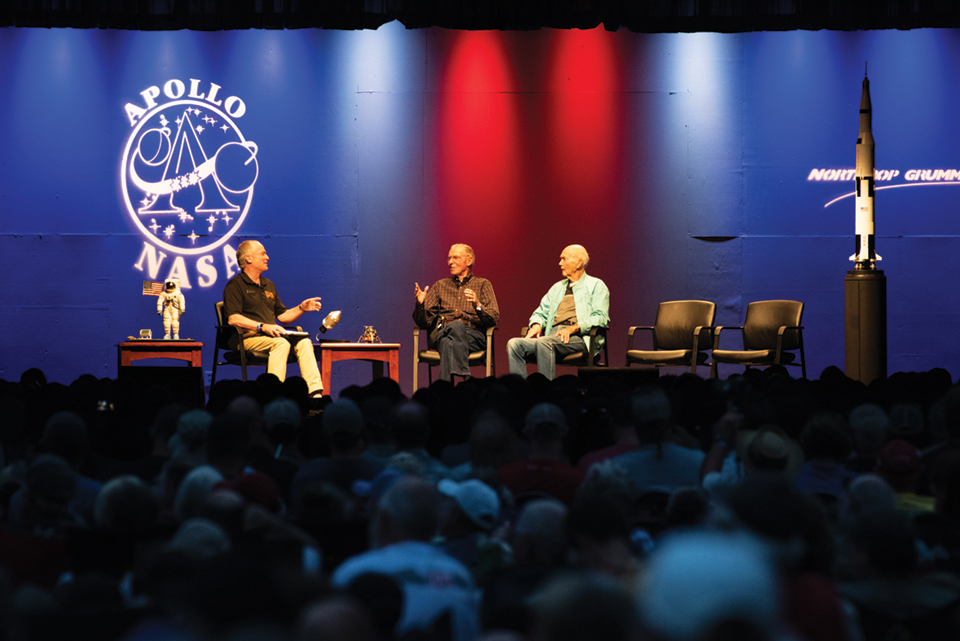From the Moon to Oshkosh
By Barbara A. Schmitz
July 28, 2019 - Even though man had walked on the moon and U.S. astronauts had returned home safely, the success of Apollo 11 rested on many small things: dozens of white mice.
Michael Collins, command module pilot for Apollo 11, said the crew was quarantined with the mice for 14 days upon their return.
"Some of our scientists thought Neal [Armstrong] and Buzz [Aldrin] were exposed on the lunar surface to deadly pathogens that would kill all mankind," he said. "The chances were extremely small, but the consequences, if true, would have been impossibly large."
So they locked up the three with 30-40 white mice and watched; Collins said the final outlook of their flight depended on what happened. "It would be a wonderful success or terrible tragedy, depending on the health of those mice."
As the world now knows, the mission was a success. EAA celebrated the 50th anniversary of the Apollo 11 mission at its 2019 fly-in convention when Collins and Joe Engle, the X-15 test pilot turned astronaut, spoke Friday in Theater in the Woods.
Collins said he was most concerned about the rendezvous and docking maneuvers on Apollo 11, despite exhaustive training. "I had over 600 hours in the command module simulator, and by the time we were airborne, things were not strange to us. Yes, the environment was strange, but the mechanical aspects were not."
Meanwhile, Engle was at Edwards and had applied to the astronaut program. He recalled being summoned to the general's office and being told to sit down. The general said he wasn't going to approve his application, and then tore it up.
"I didn't know why at the time," Engel said. "I just thought I didn't qualify." He later learned he would be flying the X-15 instead, and in 1966, he finally joined the Apollo program.
Collins recalled the rigor of the medical and psychological testing astronauts went through. One psychiatric test included looking at ink blots and telling what they saw. One page was completely blank.
"I said I saw 11 polar bears fornicating in a snowbank," Collins said. "I thought that was mildly amusing, but I could see my interrogator scowl and I flunked."
But he was a quick learner. The next year when asked, he said he saw his parents on that blank page. "And low and behold, I passed."
Collins said there was a lot of pressure on the Apollo 11 program to beat the Russians to the moon. But thanks to NASA leaders, the Apollo missions advanced quickly.
"George Low was not one of the most senior guys on the planning staff, yet he convinced NASA administrators to send Apollo 8 all the way to the moon," Collins said. "It was a very gutsy decision, but it turned out to be up a very good one. It really sped up the process."
As they got closer to reaching their goal, Collins was sometimes surprised that their achievements seemed matter of fact. Take Apollo 8, for instance. He was capsule communicator, or capcom, the astronaut in mission control who spoke directly to the crew during launch.
"We were about to have people leave Earth's orbit, to go into hypervelocity, for the first time in history," he said. "I thought surely the president would be there on my right side … the pope would send a message and Frank Sinatra would dedicate a song to this.
"But instead, [Commander] Frank Borman and I had a verbose conversation, and with all my dramatic ability, I said, 'Apollo 8, you are go for TLI.' Frank said, 'Roger, Houston.' And that was it."
Collins said Apollo 8 was an important mission, and in some ways, even more important than Apollo 11. "Apollo 8 was about leaving, and Apollo 11 was about returning. Which is more important? It's not for me to say … but both are pretty good."
Current plans to go to Mars include a gateway on the moon, but Collins said he thinks we need to go directly to Mars.
"When John F. Kennedy gave us our instructions to go to the moon, it was a masterpiece of simplicity: Get a man on the moon by the end of the decade," he said. "That was of immeasurable help to us and galvanized the whole country. On a smaller scale, it gave us a wonderful argument to get people to do what we wanted on a schedule. I think that galvanization of effort would be immensely helpful on a mission to Mars."

